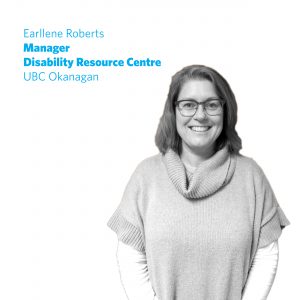As part of recognizing those who are working to remove barriers to participation, we connected with Earllene Roberts, manager of the Disability Resource Centre at UBC Okanagan. She shares with us her perspectives on building a more accessible and inclusive UBC.
Why do you think it is important to mark the National AccessAbility Week?
Now in its second year, the National AccessAbility Week is an opportunity to celebrate contributions of persons with disabilities, and consider ways that we can continue removing barriers to participation so that we build a more inclusive UBC. It’s an opportunity to think about what more we can do to promote the rights and well-being of persons with disabilities in all spheres of society and development, and to increase awareness of the situation of persons with disabilities in every aspect of political, social, economic and cultural life.
This week serves as a continued reminder of the situation that persons with disabilities still face. The mainstream discourse does yet not fully value the many contributions of disabled people and communities. For me, this week is about recognizing how our daily practices matter in terms of whether individuals, all individuals, feel included or not.
It’s really important to recognize this week. Not just one week per year. It’s about recognizing how our daily practices may be contributing to continued propagations of stereotypes and discrimination, and about reflecting on how we can all play a part in changing that.
How have things changed in recent years? What do you think would contribute to a more positive environment for people with disabilities in the workplace?
Things have certainly changed, but in the post-secondary context, people with disabilities are still significantly under represented.
In the post-secondary context, people with disabilities are significantly under represented. 27 per cent of Canadians have post-secondary degrees, as opposed to 14 per cent of disabled Canadians. As a result, these individuals often experience increased rates of poverty, lower involvement in the labour market, higher under employment and unemployment.
At the institutional level, we are working to create inclusive places for all people on campus, taking action to ensure adequate policies are in place, and making efforts to remove barriers that enable discrimination and prevent inclusion.
In order to contribute to a more positive environment, we need to look at everything that we do and take into consideration how discrimination operates – and voices of persons with disabilities are essential to these conversations. We’ve done that with other groups on other issues, so it is definitely possible.
Lastly, we also need to move beyond awareness alone and our legal duty to accommodate. While progress to date has been made largely through legal mechanism, we need to focus on reinforcing an inclusive culture where disabled people are seen as valuable members of society. Through these efforts, we want to see our disabled community members achieve same successes as non disabled people (able-bodied person).
How can students, staff and faculty members get involved in supporting a better environment for all people with disabilities on campus?
A lot of research has been done around what factors either advance or act as a barrier to inclusion. The recommendations that come out of the literature tend to focus on awareness of issues, training for faculty, and implemention of specific policies – those are all great – however, we need to continue to shift the culture at universities away from primarily ableism.
For example, our students can make a big difference to our culture by doing something as seemingly simple as how they value group work participation, how they understand how different people may approach or process the work, or do the work, and how they perceive the value of those contributions. Through these efforts with our students, staff and faculty, we are continuing to foster an environment where individual differences are valued for the benefits they can bring.
Lastly, I urge staff and faculty to reflect on how they think and talk about disability and their day-to-day actions People don’t always recognize that they’re being ableist or discriminatory. We’re seeing progress, however, there’s still work to do so that we all are comfortable with recognizing how our actions can contribute to a discriminatory culture.
